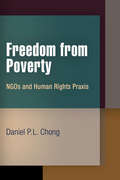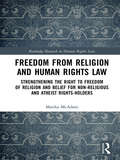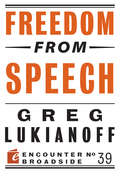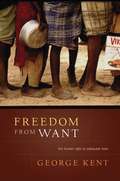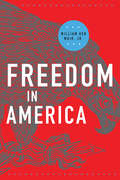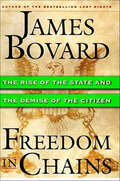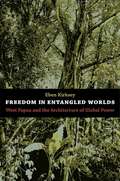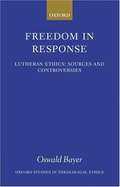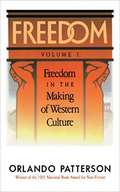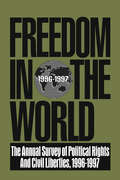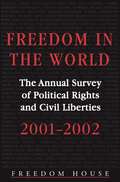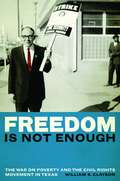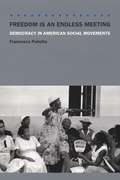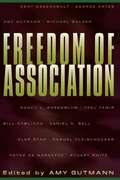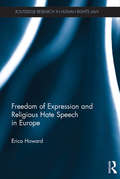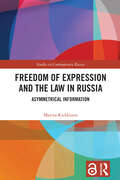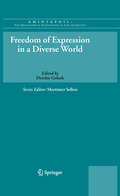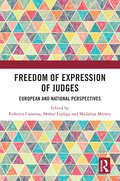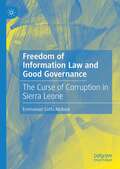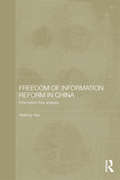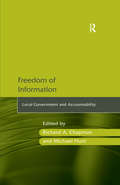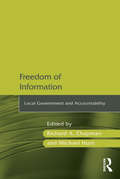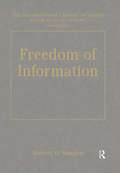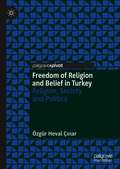- Table View
- List View
Freedom from Poverty: NGOs and Human Rights Praxis (Pennsylvania Studies in Human Rights)
by Daniel P.L. ChongHuman rights advocacy in the West is changing. Before the turn of the century, access to goods such as food, housing, and health care—while essential to human survival—were deemed outside of the human rights sphere. Traditional human rights institutions focused on rights in the political arena that could be defended through legal systems.In Freedom from Poverty, Daniel P. L. Chong examines how today's nongovernmental organizations are modifying human rights practices and reshaping the political landscape by taking up the cause of subsistence rights. This book outlines how three types of NGOs—human rights, social justice, and humanitarian organizations—are breaking down barriers by incorporating access to economic and social goods into national laws and advancing subsistence rights through nonjuridical means. These NGOs are using rights not only as legal instruments but as moral and rhetorical implements to build social movements, shape political culture, and guide development work. Rights language is now invoked in churches, political campaigns, rock concerts, and organizational mission statements. Chong presents a social theory of human rights to provide a framework for understanding these changes and defending the legitimacy of these rights.Freedom from Poverty analyzes new trends in the evolution of human rights by combining constructivist and postpositivist legal approaches. This book provides valuable concepts to human rights practitioners, political scientists, antipoverty advocates, and leaders who are serious about ending widespread privation and disease.
Freedom from Religion and Human Rights Law: Strengthening the Right to Freedom of Religion and Belief for Non-Religious and Atheist Rights-Holders (Routledge Research in Human Rights Law)
by Marika McAdamAlthough human rights belong to all persons on the basis of their humanity, this book demonstrates that in the practice of international human rights law, the freedom to be non-religious or atheist does not receive the same protection as the freedom to be religious. Despite the claimed universality of freedom of religion and belief contained in article 18 of the International Covenant on Civil and Political Rights, the key assertion made is that there is a hierarchy of religion and belief, with followers of major established religions enjoying high protection and low regulation at the top, and atheists and non-believers enduring high persecution and weaker protection at the bottom. The existence of this hierarchy is proven and critiqued through three case study chapters that respectively explore the extent to which non-religious and atheist rights-holders enjoy freedom from proselytism, freedom from hate and freedom from the religions of their parents.
Freedom from Speech
by Greg LukianoffThis is a surreal time for freedom of speech. While the legal protections of the First Amendment remain strong, the culture is obsessed with punishing individuals for allegedly offensive utterances. And academia - already an institution in which free speech is in decline - has grown still more intolerant, with high-profile "disinvitation" efforts against well-known speakers and demands for professors to provide "trigger warnings" in class. In this Broadside, Greg Lukianoff argues that the threats to free speech go well beyond political correctness or liberal groupthink. As global populations increasingly expect not just physical comfort but also intellectual comfort, threats to freedom of speech are only going to become more intense. To fight back, we must understand this trend and see how students and average citizens alike are increasingly demanding freedom from speech.
Freedom from Want: The Human Right to Adequate Food (Advancing Human Rights)
by George KentThere is, literally, a world of difference between the statements "Everyone should have adequate food," and "Everyone has the right to adequate food." In George Kent's view, the lofty rhetoric of the first statement will not be fulfilled until we take the second statement seriously. Kent sees hunger as a deeply political problem. Too many people do not have adequate control over local resources and cannot create the circumstances that would allow them to do meaningful, productive work and provide for themselves. The human right to an adequate livelihood, including the human right to adequate food, needs to be implemented worldwide in a systematic way. Freedom from Want makes it clear that feeding people will not solve the problem of hunger, for feeding programs can only be a short-term treatment of a symptom, not a cure. The real solution lies in empowering the poor. Governments, in particular, must ensure that their people face enabling conditions that allow citizens to provide for themselves.
Freedom in America
by William Ker MuirIf you want students to really understand the concept of power, moving beyond a survey book's quick discussion of Laswell's "who gets what and how," Muir's thoughtful Freedom in America might be the book for you. Exploring the words and ideas of such thinkers as Madison, Jefferson, Hamilton, and Tocqueville, Muir discusses the nature and limits of three types of power—coercive, reciprocal, and moral—and then uses this framework to explain how American political institutions work. If looking for an alternative to a long survey text—or itching to get students grappling with The Federalist Papers or Democracy in America with more of a payoff—Muir's meditation on power and personal freedom is a gateway for students to take their study of politics to the next level. His inductive style, engaging students with well-chosen and masterfully written stories, lets him draw out and distill key lessons without being preachy. Read a chapter and decide if this page turner is for you.
Freedom in Chains: The Rise of the State and the Demise of the Citizen
by James BovardGovernments and bureaucracies are bigger and more controlling than ever. A citizen's own ability to control his or her own life has never been less than it has today. How did we get to this point? Jim Bovard, bestselling author of Lost Rights, looks at the development of the State into a behemoth that threatens to destroy the individual at the cost of preserving the idea of "statism"--the belief that government is inherently superior to the citizenry, that progress consists of extending the realm of governmental compulsion, and that vesting more arbitrary power in government officials will eventually make citizens happy. Reading through the history of the state and its war on the citizen, Bovard looks at thinkers as diverse as John Locke, Etienne de la Boetie, James Madison, and Bernard Bosanquet among others. He explores the original version of the idea of the state, the development of the welfare state, the progress of the state's judicial system from the original province of the courts into the lives of men and women and the ultimate fraud that is perpetrated as the state's benevolence. Controversial and essential reading in these times of the Leviathan state, Freedom in Chains is must reading for everyone who took Jim Bovard's Lost Rights to heart as well as anyone trying to understand how far we've come from our eighteenth century roots as a community of impassioned patriots to our sorry positions as wards of the state at the end of the 20th century.
Freedom in Entangled Worlds: West Papua and the Architecture of Global Power
by Eben KirkseyEben Kirksey first went to West Papua, the Indonesian-controlled half of New Guinea, as an exchange student in 1998. His later study of West Papua's resistance to the Indonesian occupiers and the forces of globalization morphed as he discovered that collaboration, rather than resistance, was the primary strategy of this dynamic social movement. Accompanying indigenous activists to Washington, London, and the offices of the oil giant BP, Kirksey saw the revolutionaries' knack for getting inside institutions of power and building coalitions with unlikely allies, including many Indonesians. He discovered that the West Papuans' pragmatic activism was based on visions of dramatic transformations on coming horizons, of a future in which they would give away their natural resources in grand humanitarian gestures, rather than watch their homeland be drained of timber, gold, copper, and natural gas. During a lengthy, brutal occupation, West Papuans have harbored a messianic spirit and channeled it in surprising directions. Kirksey studied West Papua's movement for freedom while a broad-based popular uprising gained traction from 1998 until 2008. Blending ethnographic research with indigenous parables, historical accounts, and narratives of his own experiences, he argues that seeking freedom in entangled worlds requires negotiating complex interdependencies.
Freedom in Response: Sources and Controversies
by Oswald BayerThe leitmotif of Freedom in Response, as the title suggests, is a reasoned exposition of the nature of freedom, as it is presented in the Bible and developed by such later theologians as Martin Luther.
Freedom in the Making of Western Culture (Freedom Volume #1)
by Orlando PattersonThe projected two-volume history of freedom traces the evolution of freedom from Greece in the sixth and fifth centuries BC through the permutations wrought by imperial Rome and the Middle Ages. Unsurprisingly, the Jamaican- born Patterson, long-concerned with the problems of oppression in both his early novels and later analytic studies, is particularly good on the relationship between the birth of freedom and the institution of slavery.<P><P> Winner of the National Book Award
Freedom in the World: The Annual Survey of Political Rights and Civil Liberties
by Adrian KaratnyckyFreedom in the World is an institutional effort by FreedomHouse to monitor the progress and decline of political rightsand civil liberties in 192 nations and 17 related and disputedterritories. These year-end reviews of freedom began in1955, when they were called the Balance Sheet of Freedomand,still later, the Annual Survey of the Progress of Freedom. Thisprogram was expanded in the early 1970s, and has been issuedin a more developed context as a yearbook since 1978.Since 1989, this distinguished Survey project has been a yearlongeffort produced by regional experts, consultants, and humanrights specialists. It derives its information from a widerange of authoritative sources. Most valued of these are the manyhuman rights activists, journalists, editors, and political figureswho keep the world informed of the human rights situation intheir own countries.Throughout the year, Freedom House personnel regularly conductfact-finding missions to gain in-depth knowledge of the vastpolitical transformations affecting our world,. These investigationsmake every effort to include meetings with a cross-sectionof political parties and associations, human rights monitors, religiousfigures, representatives of both the private sector and tradeunion movement, academics, and journalists. Freedom in theWorld is now the standard reference work for measuring progress,or the lack thereof, in the process of regime democratization andpolitical maturity.Adrian Karatnycky is the president of Freedom House. AiliPiano is a senior researcher at Freedom House. This year's surveyteam includes: Martin Edwin Andersen, Gordon Bardos,Michael Goldfarb, Charles Graybow, Kristen Guida, Karin DeutschKarlekar, Edward R. McMahon, Aili Piano, Arch Puddington,Amanda Schnetzer, Cindy Shiner, Leonard R. Sussman, and KendraZaharescu.
Freedom in the World: The Annual Survey of Political Rights and Civil Liberties (Freedom In The World Ser.)
by Adrian Karatnycky Aili PianoFreedom in the Worldis an institutional effort by Freedom House to monitor the progress and decline of political rights and civil liberties in 192 nations and 17 related and disputed territories.
Freedom is Not Enough
by William S. ClaysonLed by the Office of Economic Opportunity, Lyndon Johnson's War on Poverty reflected the president's belief that, just as the civil rights movement and federal law tore down legalized segregation, progressive government and grassroots activism could eradicate poverty in the United States. Yet few have attempted to evaluate the relationship between the OEO and the freedom struggles of the 1960s. Focusing on the unique situation presented by Texas, Freedom Is Not Enough examines how the War on Poverty manifested itself in a state marked by racial division and diversity - and by endemic poverty. Though the War on Poverty did not eradicate destitution in the United States, the history of the effort provides a unique window to examine the politics of race and social justice in the 1960s. William S. Clayson traces the rise and fall of post-war liberalism in the Lone Star State against a backdrop of dissent among Chicano militants and black nationalists who rejected Johnson's brand of liberalism. The conservative backlash that followed is another result of the dramatic political shifts revealed in the history of the OEO, completing this study of a unique facet in Texas's historical identity.
Freedom is Power
by Lawrence HamiltonUsing the history of political thought and real-world political contexts, including South Africa and the recent global financial crisis, this book argues that power is integral to freedom. It demonstrates how freedom depends upon power, and contends that liberty for all citizens is best maintained if conceived as power through political representation. Against those who de-politicise freedom through a romantic conception of 'the people' and faith in supposedly independent judicial and political institutions, Lawrence Hamilton argues that real modern freedom can only be achieved through representative and participative mechanisms that limit domination and empower classes and groups who become disempowered in the conflicts that inevitably pervade politics. This is a sophisticated contribution to contemporary political theory that will be of interest to scholars and students of history, politics, philosophy, economics, sociology, development studies and Southern African studies.
Freedom is an Endless Meeting: Democracy in American Social Movements
by Francesca PollettaFreedom Is an Endless Meeting offers vivid portraits of American experiments in participatory democracy throughout the twentieth century. Drawing on meticulous research and more than one hundred interviews with activists, Francesca Polletta challenges the conventional wisdom that participatory democracy is worthy in purpose but unworkable in practice. Instead, she shows that social movements have often used bottom-up decision making as a powerful tool for political change. Polletta traces the history of democracy in early labor struggles and pre-World War II pacifism, in the civil rights, new left, and women's liberation movements of the sixties and seventies, and in today's faith-based organizing and anti-corporate globalization campaigns. In the process, she uncovers neglected sources of democratic inspiration—Depression-era labor educators and Mississippi voting registration workers, among them—as well as practical strategies of social protest. But Freedom Is an Endless Meeting also highlights the obstacles that arise when activists model their democracies after familiar nonpolitical relationships such as friendship, tutelage, and religious fellowship. Doing so has brought into their deliberations the trust, respect, and caring typical of those relationships. But it has also fostered values that run counter to democracy, such as exclusivity and an aversion to rules, and these have been the fault lines around which participatory democracies have often splintered. Indeed, Polletta attributes the fragility of the form less to its basic inefficiency or inequity than to the gaps between activists' democratic commitments and the cultural models on which they have depended to enact those commitments. The challenge, she concludes, is to forge new kinds of democratic relationships, ones that balance trust with accountability, respect with openness to disagreement, and caring with inclusiveness. For anyone concerned about the prospects for democracy in America, Freedom Is an Endless Meeting will offer abundant historical, theoretical, and practical insights. "This is an excellent study of activist politics in the United States over the past century. . . . Assiduously researched, impressively informed by a great number of thoughtful interviews with key members of American social movements, and deeply engaged with its subject matter, the book is likely to become a key text in the study of grass-roots democracy in America. "—Kate Fullbrook, Times Literary Supplement "Polletta's portrayal challenges the common assumption that morality and strategy are incompatible, that those who aim at winning must compromise principle while those who insist on morality are destined to be ineffective. . . . Rather than dwell on trying to explain the decline of 60s movements, Polletta shows how participatory democracy has become the guiding framework for many of today's activists. "—Richard Flacks, Los Angeles Times Book Review "In Freedom Is an Endless Meeting, Francesca Polletta has produced a remarkable work of historical sociology. . . . She provides the fullest theoretical work of historical sociology. . . . She provides the fullest theoretical picture of participatory democracy, rich with nuance, ambiguity, and irony, that this reviewer has yet seen. . . . This wise book should be studied closely by both academics and by social change activists. "—Stewart Burns, Journal of American History
Freedom of Association (The University Center for Human Values Series #49)
by Amy GutmannAmericans are joiners. They are members of churches, fraternal and sororal orders, sports leagues, community centers, parent-teacher associations, professional associations, residential associations, literary societies, national and international charities, and service organizations of seemingly all sorts. Social scientists are engaged in a lively argument about whether decreasing proportions of Americans over the past several decades have been joining secondary associations, but no one disputes that freedom of association remains a fundamental personal and political value in the United States. <P><P>"Nothing," Alexis de Tocqueville argued, "deserves more attention." Yet the value and limits of free association in the United States have not received the attention they deserve. Why is freedom of association valuable for the lives of individuals? What does it contribute to the life of a liberal democracy? This volume explores the individual and civic values of associational freedom in a liberal democracy, as well as the moral and constitutional limits of claims to associational freedom. Beginning with an introductory essay on freedom of association by Amy Gutmann, the first part of this timely volume includes essays on individual rights of association by George Kateb, Michael Walzer, Kent Greenawalt, and Nancy Rosenblum, and the second part includes essays on civic values of association by Will Kymlicka, Yael Tamir, Daniel A. Bell, Sam Fleischacker, Alan Ryan, and Stuart White.
Freedom of Expression and Religious Hate Speech in Europe (Routledge Research in Human Rights Law)
by Erica HowardIn recent years, the Danish cartoons affair, the Charlie Hebdo murders and the terrorist attacks in Brussels and Paris have resulted in increasingly strident anti-Islamic speeches by politicians. This raises questions about the limits to freedom of expression and whether this freedom can and should be restricted to protect the religious feelings of believers. This book uses the case law of the European Court of Human Rights to provide a comprehensive analysis of the questions: whether legal prohibitions of religious hate speech violate the right to freedom of expression; and, whether such laws should be used to prosecute politicians and others who contribute to current debates when they use anti-Islam rhetoric. A well-known politician who uses such rhetoric is Dutch politician Geert Wilders. He has been prosecuted twice for hate speech, and was acquitted in the first case and recently convicted in the second. These prosecutions are used to illustrate the issues involved in drawing the line between freedom of expression and religious hate speech. The author argues that freedom of expression of politicians and those contributing to the public debate should not be restricted except in two very limited circumstances: when they incite to hatred or violence and there is an imminent danger that violence will follow or where it stops people from holding or manifesting their religion. Based on this, the author concludes that the European Court of Human Rights should decide, if it is asked to do so, that Wilders conviction for hate speech violates his freedom of expression.
Freedom of Expression and the Law in Russia: Asymmetrical Information (Studies in Contemporary Russia)
by Mariya RiekkinenThis book discusses how Russia’s legal system restricts freedom of expression.As the author analyses legal amendments restricting the free flow of information since 2012, she draws upon Akerlof’s framework of “Asymmetrical information” and Luhmann’s “System Theory” to show how these amendments have deprived citizens of the opportunity to voice criticisms, influence public affairs, or take collective action against decision-makers. Among the innovations are the establishment of a “President Emeritus” institution and the introduction of laws through legislative processes already on hold – something we call “legislation through winter preservatives.” The author provides a nuanced understanding of these and other processes that limit the free flow of information while simultaneously exploring the reasons why Russia’s regime still endures.The volume will be of interest to scholars and students of law, political science, international law, area studies, development studies, peace research, comparative politics/comparative area studies, citizenship studies, communication studies, social movements, and international organisations. Experts working with Russia in international organisations and the media will also find this systematic analysis of the transformation of Russian legislation and its consequences invaluable.The Open Access version of this book, available at www.taylorfrancis.com, has been made available under a Creative Commons Attribution-Non-Commercial (CC-BY-NC) 4.0 license. Open Access has been funded by Åbo Akademi University.
Freedom of Expression in a Diverse World
by Deirdre GolashThe debate over the foundations and boundaries of freedom of speech, once a matter of balancing the individual rights of unpopular speakers against broader social interests, took on a new shape in the 1980s when feminists began to advocate restrictions on pornography and critical race theorists to advocate restriction of certain kinds of hate speech. These challenges to traditional liberalism brought into sharp focus the issues of why we value free speech and how much weight it should be given against competing values. Difficult as it is to resolve these issues domestically, we now face new challenges arising from the increasingly rapid dissemination of information across international borders in an atmosphere of considerable political tension. The riots in response to the publication of Danish cartoons ridiculing Mohammed and the death threats against Salman Rushdie indicate how dramatically the stakes have been raised. At the same time, there is increased concern over discriminatory treatment of sexual minorities, Muslims, and immigrants. Against this background, the essays in this volume seek to illuminate why we value freedom of speech and expression and how this freedom can be weighed against other values, such as multicultural sensitivity, the rights of racial and sexual minorities, and the prevention of violence, both domestically and internationally.
Freedom of Expression of Judges: European and National Perspectives
by Federica Casarosa, Mohor Fajdiga and Madalina MoraruThis book addresses the impact of developments surrounding the freedom of expression of judges by building on the experience of judges themselves, legal practitioners and academics across Europe. Like everybody, judges enjoy freedom of expression. However, historically, there have been starker limitations to the free speech of judges compared to ordinary citizens, the rationale being to safeguard judicial independence, impartiality and public trust in the judiciary. Where exactly the boundary lies is a highly complex question. The recent developments in Europe have rekindled the dilemma of guaranteeing freedom of expression to judges. The rule of law crisis has led many judges to speak out against the attacks of autocratic governments targeting judges and courts. The rapid expansion of the digital world has opened up new channels of communication, and the growing role of courts in society has expanded the reach of courts to practically any social issue, even the most polarised. This work critically analyses the recent jurisprudence of the Court of Justice of the EU and the European Court of Human Rights, its reception at the national level and the contribution of national judiciaries to the discussion pervading the European judicial space. It seeks to raise awareness that judicial speech is a multifaceted phenomenon shaped by complex legal and social considerations worth further exploration. The book will be of interest to academics, researchers, and policy-makers working in the areas of Human Rights Law, Constitutional Law and Politics, and Comparative Law.
Freedom of Information Law and Good Governance: The Curse of Corruption in Sierra Leone
by Emmanuel Saffa AbdulaiThis book argues that Sierra Leone’s ten-year civil conflict demonstrates the criticality of freedom of information (FOI) as a facet of good governance where corruption thrives, spanning both public and private sectors, if Sierra Leone’s continued security and stability are to be ensured. It argues that it was the absence of an anti-corruption tool like FOI and its attendants, transparency, and accountability, in governance generally, and in the area of the extractive industry in particular, that lead to other social phenomena which directly sparked the war. It proffers that for the continued consolidation of peace, security, stability and development in Sierra Leone, transparency and accountability must be ensured by protecting and implementing the demand driven anti-graft FOI.Straddling the disciplines of law, political science, public policy, and history, the book’s major premise is that it was the absence of FOI in the area of governance and the extractive industry, which enabled politicians, civil servants and the politically connected to ransom and exploit Sierra Leone’s mineral resources for their own profit with impunity, a state of affairs which led to underdevelopment, state collapse and an embittered civil populace especially the youth. The book postulates that as such any attempt to ensure long-term peace in Sierra Leone, should seek to avoid replicating the conditions that gave rise to that gruesome conflict- elites expropriation of national resources through endemic graft. The book proposes the comprehensive and effective implementation of the Right to Information Act 2013.
Freedom of Information Reform in China: Information Flow Analysis (Routledge Law in Asia)
by Weibing XiaoFreedom of Information (FOI) in China is often perceived as a recent and intriguing phenomenon. This book presents a more complex and detailed understanding of the evolution of FOI in China, using information flow analysis to explore the gradual development of government receptivity to FOI in an information environment through time. The book argues that it is necessary to reassess the widely divergent origins of FOI reform in China, and asserts that social, political and legal factors should have central roles in understanding the development of FOI in China. The book uses information flow analysis to find that FOI reform in China formed part of a much longer process of increased transparency in the Chinese information environment, which gradually shifted from the acceptance of proactive disclosure to that of reactive disclosure. FOI thus has become a beneficiary of this gradual transformation of the Chinese information environment.
Freedom of Information: Local Government and Accountability
by Michael Hunt Richard A. ChapmanThis volume contains articles examining freedom of information statutes, including those protecting government employees who expose official misconduct. Using United States laws as examples, the articles explore the relationship of these laws to administrative and constitutional theory in the United States. In addition, they demonstrate how varying conceptions of information illuminate the controversies in the application of these laws to the revolution in the electronic storage and retrieval of information. The articles allow the reader to speculate how the connection of these laws to liberal democratic theory explains their recent adoption in several countries and their international application.
Freedom of Information: Local Government and Accountability
by Michael Hunt Richard A. ChapmanThis volume contains articles examining freedom of information statutes, including those protecting government employees who expose official misconduct. Using United States laws as examples, the articles explore the relationship of these laws to administrative and constitutional theory in the United States. In addition, they demonstrate how varying conceptions of information illuminate the controversies in the application of these laws to the revolution in the electronic storage and retrieval of information. The articles allow the reader to speculate how the connection of these laws to liberal democratic theory explains their recent adoption in several countries and their international application.
Freedom of Information: Local Government and Accountability
by Robert G. VaughnThis volume contains articles examining freedom of information statutes, including those protecting government employees who expose official misconduct. Using United States laws as examples, the articles explore the relationship of these laws to administrative and constitutional theory in the United States. In addition, they demonstrate how varying conceptions of information illuminate the controversies in the application of these laws to the revolution in the electronic storage and retrieval of information. The articles allow the reader to speculate how the connection of these laws to liberal democratic theory explains their recent adoption in several countries and their international application.
Freedom of Religion and Belief in Turkey: Religion, Society and Politics
by Özgür Heval ÇınarThe freedom of thought, conscience, and religion, from which stem the tenets of pluralism, tolerance, and open-mindedness, are some of the most basic freedoms of a democratic society. This book illustrates the current state of the freedom of religion or belief in Turkey and the challenges and complex problems facing it, concentrating on the most topical issues: being compelled to reveal one’s religion and beliefs on the national identity card; the right of conscientious objection and conscientious objectors; compulsory religious education; recognition of faith groups and the opening of places of worship; and using and wearing religious symbols and dress in the public sphere.
